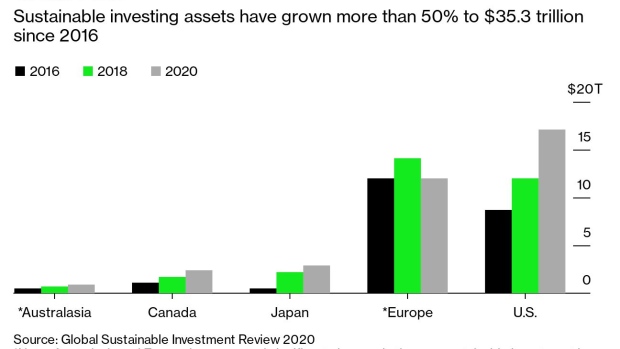Bloomberg, By Saijel Kishan
Regulations are so lax that most of what’s earmarked to do good is barely even good-adjacent.
Sustainable investment assets grew to $35.3 trillion globally last year amid mounting concerns about societal inequities and climate change. That’s about $1 of every $3 managed globally seeking out a profit from environmental, social and governance concerns, according to Global Sustainable Investment Alliance’s report last month.
It’s an impressive number. But the bulk of that money—some $25 trillion—is in a strategy called “ESG integration,” also known as “ESG consideration.” In theory, this means that managers are including ESG data in their financial models, according to GSIA.
In practice, money managers may be “aware of” and “take into account” ESG factors when making investment decisions, said Rob Du Boff, an analyst at Bloomberg Intelligence. But they’re not necessarily compelled to act on that information, he said.
Nicolette Boele, an executive for policy and standards for the Responsible Investment Association Australasia, agrees that ESG integration doesn’t always translate into action. Unless it’s paired with things like proxy voting and corporate engagement, that alone won’t necessarily “deliver better sustainability outcomes for a better world,” she said.
Global Push
Sustainable investing assets have grown more than 50% to $35.3 trillion since 2016
Source: Global Sustainable Investment Review 2020
*Note: Australasia and Europe have enacted significant changes in the way sustainable investment is defined, complicating direct comparisons between regions
“The major risk is that finance is purporting to solve social and environmental problems through ESG and that there’s no need for government action,” Sachs said. “But we need rigorous policy to address the big issues.”
Some regulators are trying. European sustainable investments shrank by $2 trillion between 2018 and 2020 as policymakers tightened the parameters for what can be considered a responsible investment, GSIA said. In March, the EU implemented a set of rules known collectively as the Sustainable Finance Disclosure Regulation, which require fund managers to classify and disclose the ESG features of their products. Those that promise to actively promote ESG goals have a higher bar to clear on transparency.
In Australia, the finance industry is relying on its own voluntary rules rather than regulators. The Responsible Investment Association Australasia has a certification program and a responsible investment-leaders scorecard that rely on publicly disclosed policies and reporting on processes to help reward responsible investing, according to Boele.
“The requirement of this transparency is key to industry accountability,” she said.







